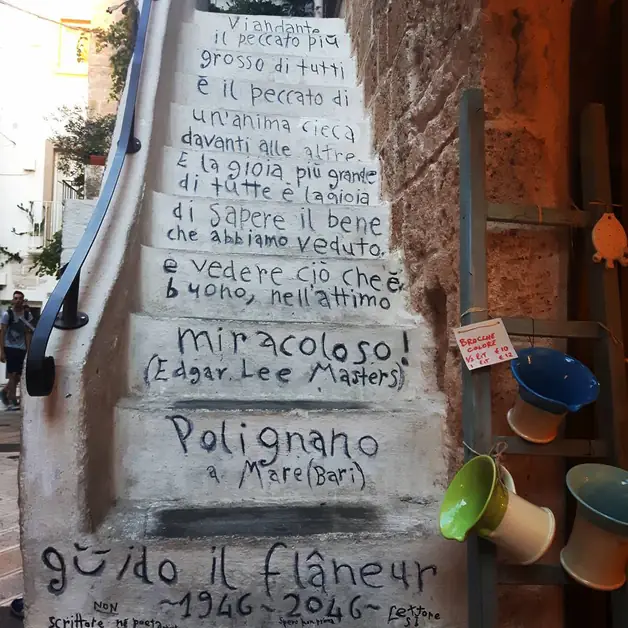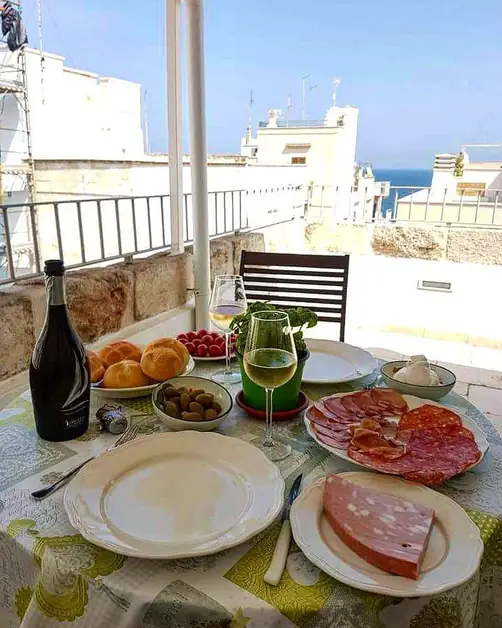Poetry and Street Art in Polignano
A journey through poetry and street art in Polignano a Mare, where walls tell stories and emotions, inviting deep reflections.

Knowing how romantic my wife is, I wanted to start the weekend with a simple walk. No strict plans, just exploring the historic center of Polignano a Mare. I knew this town mainly because it's the birthplace of the great Domenico Modugno. But I discovered much more while researching. Before our trip, I saw many Instagram photos showing phrases on walls and charming corners. So, I thought it was the perfect setting to stroll, observe details, and be surprised.
How I Prepared
Before arriving in Polignano a Mare, I had already researched those poetic phrases on the historic center's walls. I read about Guido Lupori, known as "Guido the Flâneur," a Bari native who moved to Polignano. For years, he has been writing verses and reflections in public spaces.
I was struck that he doesn't call himself a writer, but a reader. He reads everything and sees these writings as independent fragments, not a single work.
Reading his story, I learned the meaning of his pseudonym. The term flâneur originated in the 19th century. It describes an urban wanderer who roams without a specific destination, observing along the way. Exactly what I wanted to do 🤗.
I was surprised that Guido chose not to publish books. He wants the focus on the words and those who encounter them by chance. His aim, I read, is to bring young people closer to literature, without filters or explanations. Wise words: I often read that young people don't love reading 😏.
The Itinerary Through Polignano's Alleys
Only after arriving in Polignano did I see all this with my own eyes. As I guessed, the historic center invites you to slow down and look around. Among white alleys, sea views, and ancient stone houses, poetic phrases suddenly appear on walls. Little street art pieces added color to the walk. The walk was not only artistically vibrant but also romantic.
As I said, you don't need a specific route to enjoy Polignano, but I've got a suggestion. Start at Piazza Vittorio Emanuele II. From there, we wandered through the historic center. In the heart of the old town, you'll find poetry on doors, stairs, and arches. The verses are in Italian, English, French, even Latin. They're striking for their simple style: black marker, neat handwriting.
When you're there, not just looking on Instagram, walking through the alleys, you realize those walls aren't just for show. They're gentle invitations to reflect, subtly woven into the urban fabric.
Via Roma, with its charming corners, led us to Belvedere Santo Stefano. There, we found writings on stairs and railings. Many messages on the walls seem to speak directly to you, as if the city wants to chat. "Readers can fly," "The soul has no wrinkles," "You are what you love, not what happened to you." These are short, intense phrases that make you pause and think. Some are romantic, others ironic, and some philosophical.
Continuing to Via Mulini, we found more phrases hidden among steps and doors, like little gems to discover. Many tourists photograph them, share them, and hunt for them like a treasure hunt. On Via Porto, next to the bastions overlooking the Adriatic, we found more writings, accompanied by breathtaking views of the crystal-clear sea.
Residents see these writings as part of the city's identity. Some phrases have become famous among locals and are now a characteristic feature of Polignano, just like its sea caves and panoramic views.
The walk was exactly as I imagined: slow, reflective, full of small surprises. My wife was enchanted by this open-air museum, where poetry blends with daily life, and some corners hide thoughts to carry with you.
The only thing I should have considered better is parking.




